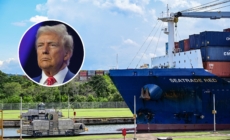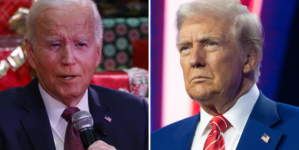-
Still Sounding Young at 85, She Is the Voice of Old Japan - 21 mins ago
-
Phoenix Airport Shooting Reports: What We Know - 29 mins ago
-
Donald Trump and Joe Biden’s Very Different Christmas Messages - about 1 hour ago
-
A Young Sudanese Trapped by War Makes Painful Choices and Is Viewed With Suspicion - about 1 hour ago
-
Ohio Officer Dies After Prison ‘Inmate Assault’ on Christmas Morning - 2 hours ago
-
20 Years Ago a Tsunami Killed 230,000 People. We Can Do Better Now. - 2 hours ago
-
Triston Casas Trade for Pitcher Now Off Table After Red Sox Sign Walker Buehler - 2 hours ago
-
Nuclear Weapons Are Not a Fact of Life - 3 hours ago
-
Aileen Cannon Grants Suspect in Trump Assassination Attempt a Trial Delay - 3 hours ago
-
Prosecutors in Taiwan Indict Ko Wen-je, Former Presidential Candidate - 3 hours ago
Taiwan Turns Tables on China With Russian Territories Jibe
Taiwan’s President Lai Ching-te has challenged China’s claim over the self-ruled island, questioning Beijing’s focus on territorial integrity. Lai suggested that if China is truly concerned about this, it should also seek to reclaim the land it ceded to Russia in the 19th century.
China claims sovereignty over Taiwan, despite the fact that the Chinese Communist Party has never governed the island. In recent years, Beijing has increased military activity near Taiwan to exert pressure, including major drills following the inauguration of Lai, whom Beijing views as a “separatist.”
In an interview on the TV program The View with Catherine Chang, marking his first 100 days in office, Lai said: “If China wants to annex Taiwan… It’s not for the sake of territorial integrity. If it is really for the sake of territorial integrity, why doesn’t China take back Russia?”

Annabelle Chih/Getty Images
Lai referenced the 1858 Treaty of Aigun, which saw China cede large swathes of Manchuria north of the Amur River to Russia. This concession occurred during what China refers to as the “century of humiliation,” when Western powers and Japan exploited the weakened Qing Dynasty.
Recently, the issue has resurfaced among some Chinese nationalists, who argue that Moscow should return the lost territory, including Vladivostok, the largest city in the Russian far east.
The Chinese government has been silent on the issue, instead emphasizing the strength of the Beijing-Moscow relationship as an alternative coalition to the U.S.-led West.
Russia, for its part, has become heavily dependent on Chinese exports and demand for oil and natural gas amid international sanctions imposed after Vladimir Putin’s 2022 invasion of Ukraine.
In 2023, China’s Natural Resource Ministry mandated that new maps use Chinese names for Vladivostok and seven other cities in the region.
The new map also depicted a small island at the confluence of the Ussuri and Amur Rivers as being entirely within Chinese territory, despite its status as jointly owned since a 2008 border agreement.
After losing the Chinese Civil War to Mao Zedong’s communists in 1949, the Republic of China government retreated to Taiwan, establishing a rump state that later democratized in the 1980s and 1990s. Previously, the island had been under Japanese occupation from 1895 to 1945 and nominally controlled by the Qing dynasty before that.
CIA Director William Burns and U.S. Indo-Pacific Command chief Admiral Samuel Paparo have indicated that they believe Chinese President Xi Jinping has directed his forces to be capable of an invasion by 2027. However, this does not necessarily mean that this or any other year has been chosen for such an undertaking.
The Chinese and Russian Foreign Ministries did not immediately respond to written requests for comment.
Source link




















